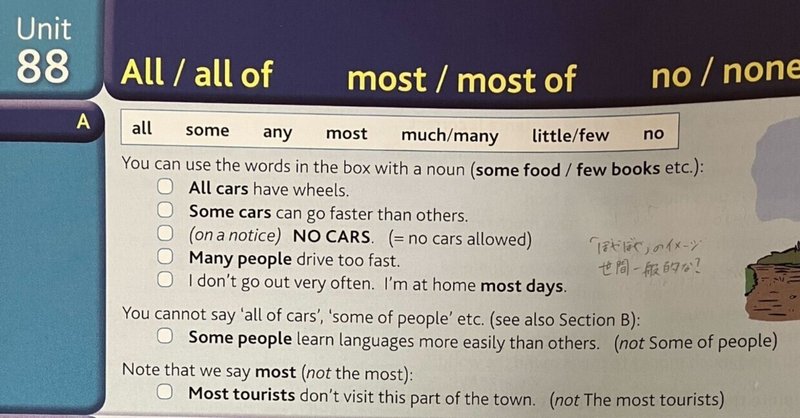
All/all of, most/most of, no/none ofの違い
昨日は、オンライン英会話で先週の土曜日、日曜日の過ごし方について聞かれ、まったく返答を予定していなかったので、いつも通りアタフタ😭
A tutor asked me about spending day off that are last Saturday and Sunday. But I didn't prepare to answer it, so I wasn't able to answer because I'm confused as usual.
でも、「一昨日は、実家の田植えの手伝いをして、それから昨日は、自治体が開催しているセミナーに妻と参加し、沐浴とオムツ替えの仕方を学びに行ったよ」までは何とか言えた。
But I managed to say that my wife and I learned how to bathe and change a baby's diaper (note: it seems that you can also say "nappy" in the UK) at a seminar held by the city hall and also to say that I helped my parents to plant rice fields last Sunday.
けど、「その田んぼは、全部君のモノなのかい?」と聞かれ、頼まれているモノもあるけど…と答えたかったけど、答えられず終了。一応、教えてもらったフレーズを記録。まぁ練習あるのみっす…。
The tutor asked me, "Are all the rice fields yours?" so I tried to say "They ask us to take care of some rice fields.", but I couldn't. Well, I just need to practice.
さて、今回学習したワードは、allやall ofといったニュアンスの違いです。自分なりの各イメージをまとめます(自信はないですが)。間違ってたら誰かコメントください🐯
Then, this time I studied the words for the difference between "all, all of" or something like that. I've summarized these images and impressions that I got from the text pages. But I'm not sure, so If I have them that are wrong. Please send me a correct message.
使用教材について
現在、僕が主に使用している文法書は、以下の書籍です。
The grammar textbook that I've mainly been using is the following.
イメージがはっきりしない "all" 類
1.「all, some, any, most, much/many, little/few , no + 名詞」のイメージは、「ぼやぼや」とそのイメージがはっきりしないイメージ。
2.例えば、All cars have wheels.「全ての車にはタイヤがある」のように世界中の車とか一般的にとか、どの車かを限定してない。
【例】
①All cars have wheels.
→世間一般的に溢れてる車的な。
②Some cars can go faster than others.
→世間一般的にあるいくつかの車的な。
③(on a notice) No Cars. (=no cars allowed.)
→限定せずどの車も駄目といった感じ。
④Many people drive too fast.
→誰がという限定的ではなく、この辺りの多くの人は一般的に的な感じ。
⑤I don't go out very often. I am at home most days.
→一日中ほぼ居たといった感じに限定していない。
3.all of carsとかsome of peopleとかは言わない(仮に言う場合は、ケースにもよるがsome of them)。その場合は、some peopleでよい。ofを付けた時点で説明範囲が限定的になるイメージになるから。
【例】
①Some people learn languages more easily than others.
→言語を習得しやすい人も中にはいくらかいる、といった世間一般的にそういうこともあるよねといった感じ。
4.この場合の、「ほとんどの〇〇」といった具合の「most+名詞」の場合、本来の最上級的な扱い「the most+名詞」にならないので注意が必要。ただし、この場合も一般的にとか、【例】で言うと旅行者を限定していない。
【例】
①TheMost tourists don't visit this part of the town.
→ほとんどの旅行者は町の一部分には行かないといった具合に、どの旅行者ということを限定していない。
イメージを限定化する "of" の働き
1.『「all, some, any, most, much/many, little/few , half, none」+「of」+ 「the, this, those」+「名詞」』のイメージは、ofが付いた時点で説明範囲を限定している。
【例】
①Some of the people I work with aren't very friendly.
→私と一緒に働いている何人かはフレンドリーでない。といった具合に、「自分と一緒に働いている人等」と説明範囲を限定している。
②None of this money is mine.
→目の前にあるお金は私の物ではない。といった具合に、目の前にあるお金がイメージがはっきりしている。
③Have you read any of these books?
→ここにある本のどれか読んだことある?的な感じで、例えば目の前に本棚があるイメージがはっきりしている。
④I was sick yesterday. I spent most of the day in bed.
→昨日という日をほとんどベットで過ごしたという感じで、昨日のほとんどのイメージがある。
2.allとhalfの後ろにofを付ける必要はない。しかし、自分の会話する際にallを使う場合、話す対象範囲が広すぎるので(ぼやぼやイメージ)、all ofで説明範囲を限定しながら話す方が相手側にとっても親切になる。その一方で、講演する場合などの時は、一方的に聴衆へ話すのでallでも自然な感じがしそう。
【例】
①All my friend live in Los Angeles.
→もしくは 、 All of my friends live in Los Angeles.といった具合に、どちらでもいい。
3.AllとAll of、それとMostとMost ofの比較をしてみると、限定的に説明をする必要があることが分かる。
【Allの場合】
・All flowers are beautiful.
→世間一般的に花は綺麗、といういうこと。限定していない。
【All of の場合】
・All of the flowers in this garden are beautiful.
→ofを入れることで「花の具体的なグループ」、つまり説明範囲を「庭にある花」に限定し、イメージがはっきりしている。
【Mostの場合】
・Most problems have a solution.
→世間一般的に問題には解決策がある、ということ。限定してない。
【Most of の場合】
・We were able to solve most of the problems we had.
→我々が抱えているほとんどの問題を解決する必要があった。といった具合に、抱えている問題に限定し、イメージがはっきりしている。
代名詞との組み合わせ
1.「some of 、all of 、none of + 代名詞(it / us / you / them)」 と組み合わせることが出来る。
【例】
①How many of these people do you know?
"None of them." / "A few of them."
→この場にいる人達でどのくらい知り合いがいる?
(彼らの中には)誰もいない。/(彼らの中なら)少し知ってる。
②Do any of you want to come to a party tonight?
→(あなた等のうちの誰でもいいから)今夜パーティ来たい人いる?
③Do you like this music?
"Some of it. Not all of it"
→(好きな音楽のうち)いくつかは好き。全てではないけど。
2.someやmostらは、文章内でその名詞を繰り返し説明する場合、省略することができる。
【例】
①Some cars have four doors and some have two.
→4 つのドアを持つ車もあれば、2 つのドアを持つ車もある。といったように、同じ名詞(ここだとcar)について繰り返す場合、carを省略できる。
②A few of the shops were open, but most (of them) were closed.
→少しの店は開いてたけど、ほとんどの店は閉まってた。といったように、shopsを省略している。一方で、of themで表すことも可能。
少し疲れましたので、今回はここまで…🫠(プシュー)
I was a little tired so that was all for now.
Thanks for reading to the end!
I also run my Twitter account. @tsubuman8
この記事が気に入ったらサポートをしてみませんか?
